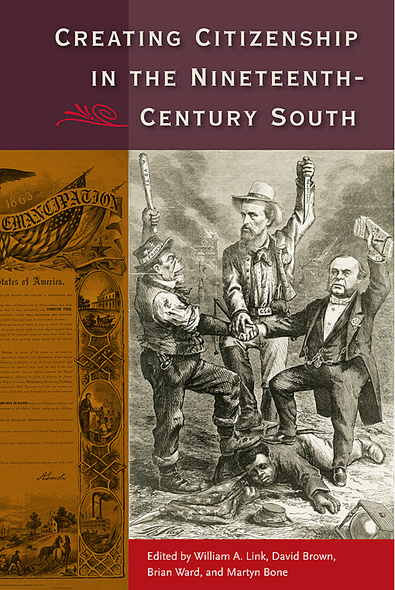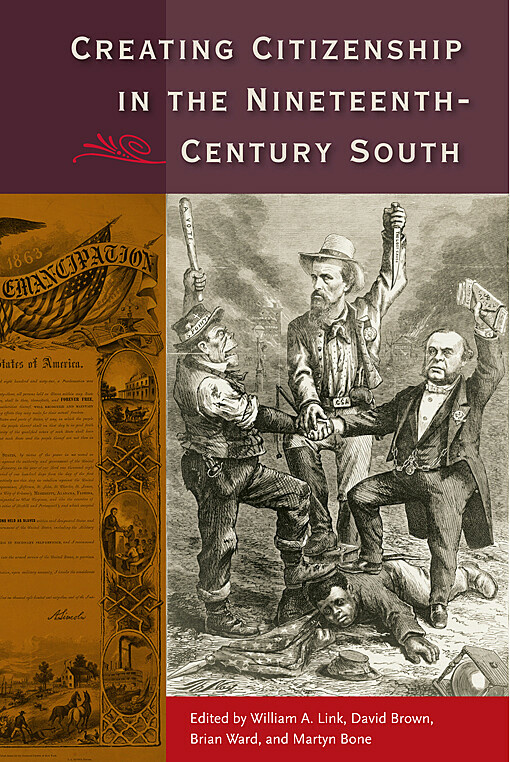Our shopping cart is currently down. To place an order, please contact our distributor, UTP Distribution, directly at utpbooks@utpress.utoronto.ca.
Creating Citizenship in the Nineteenth-Century South
“This is a remarkable collection of essays. Citizenship clearly forms the backbone for these investigations but the range of the contributors’ backgrounds (in terms of disciplinary training) and the approaches they take to the question makes this collection both broad and deep. As it turns out, there is no other way to tackle a concept as central but also as slippery as citizenship. A shorter or more focused collection would miss the nuances and insights that this one offers.”—Aaron Sheehan-Dean, author of Why Confederates Fought: Family and Nation in Civil War Virginia “President Obama’s citizenship continues to be questioned by the ‘birthers,’ the Cherokee Nation has revoked tribal rights from descendants of Cherokee slaves, and Parliament in the U.K. is debating ‘citizenship education.’ It is in both this broader context and in the narrower academic one that Creating Citizenship in the Nineteenth-Century South stands as a smart, exciting, and most welcome contribution to southern history and southern studies.”—Michele Gillespie, author of Katharine and R.J. Reynolds: Partners of Fortune and the Making of the New South “Combining historical and cultural studies perspectives, eleven well-crafted essays and a provocative epilogue engage the economic, political, and cultural dynamics of race and belonging from the era of enslavement through emancipation, reconstruction, and the New South.”—Nancy A. Hewitt, author of Southern Discomfort More than merely legal status, citizenship is also a form of belonging, shaping individual and group rights, duties, and identities. The pioneering essays in this volume are the first to address the evolution and significance of citizenship in the American South during the long nineteenth century. They explore the politics and contested meanings of citizenry from a variety of disciplinary perspectives in a tumultuous period when slavery, Civil War, Reconstruction, and segregation redefined relationships between different groups of southern men and women, both black and white. Contributors: Daina Ramey Berry | James J. Broomall | David Brown | Jennifer Rae Greeson | Watson Jennison | Susanna Michele Lee | William A. Link | Michael O’Brien | Scott Romine | Peter Schmidt | Daryl Michael Scott | Emily West
A diverse and stimulating collection of essays that suggests how much the nineteenth-century South can teach us about one of the defining concepts of modern history.'—Journal of American History 'As soon as we consider citizenship to be a matter of belonging and identity and not just of political participation, it becomes a much more expansive and interesting lens through which to view the South.'—Journal of American Studies 'Provide[s] an expansive conceptual framework of citizenship that combines historical and cultural perspectives to address the economic, political, and cultural dynamics of race and belonging in the nineteenth-century South.'—Reviews in American History 'A useful addition to the field, especially in its framing of citizenship as not merely a matter of legal enactments or electoral politics, but also as a process of social and cultural negotiations and exclusions.'—H-Net 'Focusing on the diverse experiences of marginalized southerners, the contributing scholars make it clear that the evolution of citizenship in the nineteenth-century South was crucial in shaping not only the region’s social, economic, and political culture, but also that of the United States and the wider world.'—History: Reviews of New Books 'Speaks to and develops much of the most recent scholarship on southern society, on the development of the market economy in the South, and on the shifting parameters of citizenship within the matrix of modernity, as well as touching on broader discussions of nationalism and its construction(s) within the United States as a whole.'—American Nineteenth Century History 'Provocative essays that expand the study of an important topic. They raise interesting questions, point to new avenues of inquiry, and challenge scholars to think about the South’s relationship to the nation and the world.'—Journal of Southern History 'Contributes a great deal to further understanding the complexities of the meaning of citizenship in such a complicated society.'—North Carolina Historical Review
William A. Link, Richard J. Milbauer Professor of History at the University of Florida, is the author of Links: My Family in American History. David Brown, senior lecturer in American studies at the University of Manchester, is the coauthor of Race in the American South: From Slavery to Civil Rights. Brian Ward, professor of American Studies at Northumbria University, is the author of Radio and the Struggle for Civil Rights in the South. Martyn Bone, associate professor of American literature at the University of Copenhagen, is the author of The Postsouthern Sense of Place in Contemporary Fiction.





